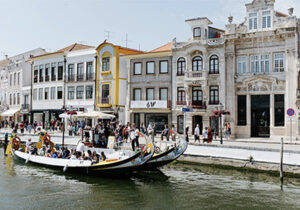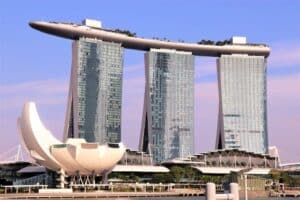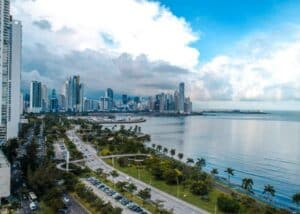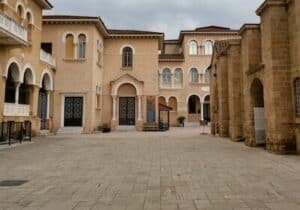International real estate investing has been made popular and accessible due to special programs like the Golden Visa or citizenship by investment schemes that offer real estate purchases as investment options.
There are a few things to consider before making an international real estate investment. This guide will take you through a step-by-step process of choosing the best property for investment.
We will help you understand market growth rates, rental yield, and price per square meter to know how all of these factors will impact the profitability of your foreign property investment.
Here is more of what the guide will cover:
- How to choose the best country for real estate investment
- Benefits of international real estate investments
- 20 Best Countries for International Real Estate Investment
- Best Countries for International Real Estate Investment Ranking
- How to Buy International Real Estate
- Taxes to Look Out for When Buying Property Abroad
How to Choose the Best Country for Real estate Investment
International property investment can be intimidating, but understanding factors like market growth rate, economic stability, and rental yield can guide your decisions and help you see if an investment will meet your goals. This basic knowledge, along with choosing the right location, makes it easier to understand if a property could be profitable.
1. Market growth rate
Market growth rate refers to the annual percentage increase in the value of real estate in a particular area. It’s important for investors because it indicates potential profitability. A higher growth rate suggests a strong demand for property, which leads to increased property values and potential rental income. Therefore, checking the historical and projected growth rates of property values in the country you wish to invest in is crucial.
2. Price per square meter
The price per square meter is important for property investment because it helps investors compare different properties and understand market trends. It also aids in budgeting, as investors can calculate total costs based on the size of the property. Higher prices per square meter often mean more demand, leading to better rental income.
3. Rental yield
Rental yield is a key metric used by real estate investors to measure the return on investment from rental properties. It shows how much money you can make from renting out a property compared to how much you paid for it. This means high rental yields can provide a steady income stream and make the investment more attractive.
4. Economic stability
Evaluate the country’s economic health, including GDP growth, employment rates, and inflation. A stable economy supports real estate value.
5. Legal framework
Understand the key laws regarding property ownership, foreign investment, and any restrictions. A stable and clear legal framework helps reduce the chances of legal issues and unexpected problems, lowering the risk of losing money. It also makes buying, selling, and renting property easier and safer, giving investors more confidence in their investment over time.
6. Location and demand
Focus on areas with high demand for housing, such as urban centers or tourist destinations. Location significantly impacts rental income and property appreciation.
7. Infrastructure development
Look for countries investing in infrastructure improvements, such as transportation, schools, and healthcare. These developments can enhance property values.
8. Political stability
Consider the political environment and any potential risks. Stable political conditions reduce investment risks and contribute to market confidence.
9. Currency stability
Lastly, consider the stability of the local currency. A stable or appreciating currency can enhance returns when converting back to your home country’s currency.
Benefits of International Real Estate Investments
Investing in international real estate offers a variety of benefits that can enhance your financial portfolio and lifestyle. Here are some key advantages:
 Diversification of investment portfolio
Diversification of investment portfolio
Buying overseas property allows investors to diversify their portfolios geographically, reducing the risk of investing in a single country. This diversification can help mitigate the impact of local economic downturns, political instability, or market volatility.
 Potential for high returns
Potential for high returns
Certain international markets offer high rental yields and significant appreciation potential. Emerging markets, in particular, can provide substantial returns due to their growing economies, increasing foreign investments, and rising property values.
 Hedge against inflation
Hedge against inflation
Real estate often serves as a hedge against inflation. Property values and rental incomes tend to rise with inflation, preserving the real value of your investment. Investing in countries with high inflation rates can amplify this effect, providing better returns compared to domestic investments.
 Currency diversification
Currency diversification
Investing in properties in different currencies can help protect you if your home currency loses value. When converting back, the value of your international properties might increase, balancing out the loss from your home currency’s depreciation.
 Residency and citizenship opportunities
Residency and citizenship opportunities
Many countries offer residency or citizenship programs in exchange for real estate investments. These programs can provide valuable benefits such as visa-free travel, tax advantages, and the ability to live in a new country. Popular programs include the Golden Visa in Portugal and Spain and the Citizenship by Investment programs in the Caribbean.
20 Best Countries for International Real Estate Investment
1. Portugal
Market growth rate: Approximately 6.5% (2023)
- Rental yield: Around 6-7%
- Price per square meter: €1,483
Portugal is an attractive option for purchasing international real estate due to its growing market, which is driven by tourism and strong rental demand. While the Portugal Golden Visa program no longer includes real estate investment, the property market still grows at around 6.5% annually.
Investors should be aware of taxes like IMT (Property Transfer Tax) of 1%-8%, Municipal Property Tax (IMI) of 0.3%-0.8%, and capital gains tax of 28% on property sales. There are restrictions, particularly in cities like Lisbon and Porto, where foreign buyers face limited property purchases, especially for short-term rentals.
. 2. Spain
Market Growth Rate: About 5.5% (2023).
- Rental yield: Approximately 5-6%
- Price per Square Meter: €1,645
Spain offers great potential for purchasing international real estate, with a growing market and high demand from tourists and renters. Property growth is around 7%, and the country is one of the few offering a Spain Golden Visa program through real estate investment, requiring a minimum of €500,000. This residency grants access to the Schengen Area. Spain’s pleasant climate and rich culture make it ideal for owning property overseas, whether for a holiday home or rental investment.
Some taxes to keep in mind include Property Transfer Tax (ITP) of 6%- 10%, capital gains tax of 9%- 23%, and annual property taxes (IBI). Foreign buyers should be mindful of restrictions on certain types of properties, such as those in protected heritage zones or areas designated for conservation.
3. Greece
Market Growth Rate: Approximately 8.7% (2023)
- Rental yield: Approximately 5-7%
- Price per Square Meter: €1,176
Greece is a great option for international real estate investors, offering an attractive property market with a growth rate of around 7%. The Greece Golden Visa allows residency with a €250,000 real estate investment, making it one of the more accessible options in Europe.
Investors are drawn to the country’s beautiful landscapes, warm climate, and high rental demand, which is ideal for vacation homes or income-generating properties. The country has a Property Transfer Tax of 3%, a capital gains Tax of 15%, and annual property taxes (ENFIA). Restrictions may apply to properties in protected or coastal zones.
4. Italy
- Market Growth Rate: Around 7.2% (2023)
- Rental yield: About 4-6%
- Price per Square Meter: €2,335
Italy’s real estate market attracts investors with its rich culture, strong tourism sector, and cities like Milan and Rome, where the average property growth rate is around 3.5%. The country offers unique lifestyle benefits, from scenic landscapes to historic architecture. While the Italy Golden Visa doesn’t include real estate investment, it provides residency through other investment routes, such as €500,000 in businesses or startups.
When purchasing property in Italy, keep in mind that there are taxes like Property Transfer Tax (up to 9%), Annual IMU Property Tax, and capital gains Tax (up to 26%). There may be restrictions on buying properties in historical areas.
5. Hungary
Market Growth Rate: About 4.5% (2023)
- Rental yield: About 6-8% (particularly in Budapest)
- Price per Square Meter: €1,084
Hungary offers an attractive real estate market with affordable property prices, particularly in Budapest, and strong rental income potential, with an average growth rate of around 5%. The country has reintroduced the Hungary Golden Visa, which allows foreign nationals to gain residency by investing €250,000 in a state-approved real estate investment fund.
The country also has property taxes, including a 4% Property Transfer Tax, an Annual Property Tax that varies by municipality, and a capital gains Tax of up to 15%. Foreign buyers should also know that non-EU citizens are restricted from purchasing agricultural land.
6. Antigua and Barbuda
Market Growth Rate: Approximately 5% (2023)
- Rental yield: Generally 5-8%
- Price per Square Meter: $1,542
Antigua and Barbuda presents a solid opportunity for foreign investors interested in international real estate, particularly through the Antigua and Barbuda citizenship by investment program. Investors can obtain citizenship by investing at least $300,000 in real estate. The market grows steadily at about 5%, fueled by the country’s popularity as a tourist destination.
Beautiful beaches, a relaxed lifestyle, and favorable tax policies make it an attractive place for owning real estate or pursuing a rental investment. There are no property taxes on real estate in Antigua and Barbuda, but a Stamp Duty of 4% is due on property transactions. The government encourages foreign investment but limits the purchase of agricultural land to nationals.
7. Dominica
Market Growth Rate: About 3% (2023)
- Rental yield: Approximately 6-8%
- Price per Square Meter: $900
Dominica offers an attractive opportunity for foreign investors interested in international real estate, particularly through its Dominica citizenship by investment program. With a minimum investment of $200,000 in real estate, investors can secure citizenship and enjoy a steady market growth of around 4%. The country’s focus on eco-tourism and its lush landscapes make it ideal for those looking for a second home or serene getaway.
Investors should be aware of a 4% Stamp Duty on property transactions and restrictions on purchasing agricultural land. However, Dominica has no property taxes, making it a favorable destination for owning real estate and rental investments.
8. St. Kitts and Nevis
Market Growth Rate: Approximately 4.2% (2023)
- Rental yield: Around 5-7%
- Price per Square Meter: $1,200
St. Kitts and Nevis offers a strong real estate market, particularly for foreign investors looking to take advantage of the St. Kitts and Nevis citizenship by investment program. With a minimum real estate investment of $400,000, investors can benefit from a market growth rate of around 5%.
The country’s luxury resorts and beautiful landscapes make it ideal for real estate ownership, especially for those looking for a holiday home. Investors will need to pay a 10% Stamp Duty on property purchases and the need for approval when buying property in certain areas. However, the attractive tax regime, with no capital gains or inheritance taxes, makes it a favorable option for international investors.
9. Grenada
Market Growth Rate: About 5.2% (2023)
- Rental yield: About 5-6%
- Price per Square Meter: $1,100
Grenada offers a unique opportunity for international investors with the Grenada citizenship by investment program, which requires a minimum real estate investment of $270,000 in shares or $350,000 as a sole owner. The country’s real estate market experiences an average growth rate of about 4%, focusing on resort-style properties, making it an attractive option for investors interested in both a lifestyle and investment opportunity.
There is a 5% Stamp Duty on property purchases. Additionally, while there are no capital gains taxes, investors must gain government approval for certain property types. Grenada’s stunning beaches and strong tourism sector further enhance the appeal of investing in the country.
10. St. Lucia
Market Growth Rate: Approximately 4% (2023)
- Rental yield: Approximately 6-8%
- Price per Square Meter: $1,150.
St. Lucia is a great option for real estate investors, especially with the St. Lucia citizenship by investment program. To qualify, you must invest at least $300,000 in real estate. The market grows at an average rate of about 5%, thanks to the high demand for vacation homes and resorts.
The country charges a 2% Stamp Duty on property purchases and an annual property tax of 0.25% to 0.75%, depending on the property’s value. With beautiful landscapes, great weather, and the bonus of visa-free travel with a St. Lucian passport, St. Lucia offers both good investment opportunities and a pleasant lifestyle.
11. France
- Market Growth Rate: About 5% (2023)
- Rental yield: Around 3-5%
- Price per Square Meter: €4,114
France offers a diverse real estate market with high demand, especially in major cities like Paris. The average property growth rate is about 3%, making it a stable option for investors. While you can apply for a long-term visa when investing in real estate, it doesn’t directly lead to citizenship.
France’s rich culture, historical sites, and strong economy make it an appealing choice for international investors. However, be mindful of taxes such as a 7.5% Stamp Duty on property purchases and annual property tax, which can vary by location.
12. Germany
- Market Growth Rate: Approximately 5.5% (2023)
- Rental yield: Generally 4-6%
- Price per Square Meter: €3,200
Germany offers a stable and strong real estate market, making it an attractive option for those purchasing international real estate, especially in high-demand cities like Berlin and Munich.
An average growth rate of about 4% provides reliable long-term investment opportunities. The country’s central location in Europe and high quality of life add to its appeal. Property taxes include a 3.5% property transfer and annual property taxes, which can differ by region. Germany also has strict rental regulations, so it’s essential to be informed about tenant protections.
13. Netherlands
- Market Growth Rate: Around 6.8% (2023)
- Rental yield: About 4-5%
- Price per Square Meter: €3,215
14. Turkey
- Market Growth Rate: Around 10% (2023).
- Rental yield: About 4-6%.
- Price per Square Meter: €1,000
Turkey offers a dynamic real estate market, with an average growth rate of around 10%, making it one of the fastest-growing markets in Europe. The country attracts foreign investors through Turkey’s citizenship by investment program, requiring a minimum investment of $400,000 in real estate to obtain citizenship.
Investors should be aware of the 4% property transfer tax and the annual property tax. Additionally, Turkey has specific rules for foreign buyers, such as restrictions on purchasing property in certain military zones. The strong growth potential and competitive pricing make it an appealing option for investing overseas.
15. United States
- Market growth rate: 4-5% (2023)
- Rental yield: 6-8%
- Price per square meter: $2,800 (Miami), $6,000 (New York)
The U.S. is a strong real estate market for international investors due to its stable economy, high rental demand, and diverse property options. Cities like New York, Miami, and Los Angeles attract foreign buyers because of their strong appreciation potential and rental demand. However, capital gains taxes range from 15% to 20% at the federal level, with some states like California imposing additional taxes up to 13.3%.
Property taxes vary significantly depending on the state, with New Jersey having one of the highest at 2.21%, while Hawaii’s rate is just 0.29%. While there are no foreign buyer restrictions, financing can be challenging without a U.S. credit history. For those looking to move to the U.S., the EB-5 Visa requires a minimum investment of $800,000 in a U.S. business that creates jobs.
16. United Kingdom
- Market growth rate: 2.1% (2023)
- Rental yield: 4-6%
- Price per square meter: £6,200 (London), £3,500 (Manchester)
The U.K. is a popular destination for international real estate investors due to its strong legal protections and stable rental market. High-value locations like London and cities like Manchester, Birmingham, and Liverpool offer attractive investment opportunities. Foreign buyers in the U.K. face an additional 2% surcharge on stamp duty and capital gains tax ranges from 18% to 28% for foreign investors selling U.K. property. Property taxes differ by local council but are generally lower compared to the U.S. The country also offers the Innovator Visa, which requires an investment of at least £50,000 into a U.K. business and provides a path for investors looking to live in the U.K. through business involvement.
17. Singapore
- Market growth rate: ~5% (2023)
- Rental yield: 2-4%
- Price per square meter: SGD 18,000 (prime areas)
Singapore offers a tax-friendly environment and stable economy, making it a global financial hub and an attractive real estate investment destination. Foreigners can only purchase condos and landed properties with government approval, but the high demand for rental properties, especially from expats and businesses, makes it a profitable market.
In addition to the high Additional Buyer’s Stamp Duty (ABSD) of 60% for foreign buyers, there are no capital gains taxes on property sales, allowing investors to benefit from tax-free profits. The Global Investor Program (GIP) grants permanent residency to investors who commit at least SGD 2.5 million to a business or investment in Singapore.
18. Panama
- Market growth rate: 5-6% (2023)
- Rental yield: 7-9%
- Price per square meter: $1,200 (Panama City)
Panama provides an appealing market for international real estate investors, thanks to its favorable tax policies and attractive property prices. The country’s booming real estate market offers high rental yields, particularly in Panama City and popular beach areas.
Investors can expect a 10% capital gains tax on property sales, with relatively low property taxes and exemptions for properties valued under $120,000. There are no restrictions on foreign buyers, and the Friendly Nations Visa offers a fast track to residency for those who can prove economic ties to Panama through business ownership or employment.
19. UAE
- Market growth rate: 7-8% (2023)
- Rental yield: 6-8%
- Price per square meter: AED 10,000 (Dubai)
The UAE, particularly Dubai, is a rapidly growing real estate market with high rental yields and no income tax, making it highly attractive to international investors.
The absence of capital gains tax on property sales is appealing, and the country’s low property taxes add to the financial benefits. Foreign buyers face no restrictions, and the UAE Golden Visa offers long-term residency to investors who make a minimum investment of AED 2 million ($545,000) in real estate.
20. Cyprus
- Market growth rate: ~5.8% (2023)
- Rental yield: ~5–7%
- Price per square meter: €2,500 (Nicosia), €3,500 (Limassol)
Cyprus has a growing real estate market with strong returns, especially in tourist-heavy areas like Limassol and Nicosia. The market growth rate is around 5.8%, with rental yields ranging from 5–7%. The country’s favorable tax policies and low property taxes make it an attractive option for international investors.
Investors will be liable for 20% capital gains tax on profits from property sales. There are no restrictions on foreign buyers, and purchasing property valued at a minimum of €300,000 can qualify investors for the Cyprus Golden Visa, offering long-term residency for those who meet the investment criteria.
Best Countries for International Real Estate Investment Ranking
Rank | Country | Rent Yield (%) | Price per Square Meter (€) | Market Growth (%) | Residency/Citizenship |
1 | Turkey | 7.5 | 7.5 | 5.5 | Citizenship |
2 | Cyprus | 6.2 | 2,400 | 4.0 | Residency |
3 | Antigua and Barbuda | 7.0 | 1,800 | 4.2 | Citizenship |
4 | Dominica | 6.8 | 1,700 | 1,700 | Citizenship |
5 | St. Kitts and Nevis | 6.5 | 1,600 | 4.1 | Citizenship |
6 | Grenada | 6.3 | 1,500 | 4.0 | Citizenship |
7 | St. Lucia | 6.0 | 6.0 | 4.0 | Citizenship |
8 | USA | 4.5 | 4.5 | 3.7 | Green Card |
9 | Greece | 7.0 | 1,700 | 6.0 | Residency |
10 | Portugal | 6.0 | 2,300 | 4.5 | Residency |
11 | Spain | 5.5 | 2,000 | 2,000 | Residency |
12 | Italy | 4.0 | 2,100 | 3.5 | Residency |
13 | France | 4.0 | 2,500 | 2,500 | Residency |
14 | Germany | 4.2 | 2,600 | 4.2 | Residency |
15 | Netherlands | 4.3 | 2,800 | 2.9 | Residency |
16 | UK | 3.8 | 2,900 | 2.7 | Residency |
17 | Singapore | 3.0 | 3,500 | 3.0 | Residency |
18 | Panama | 5.0 | 1,400 | 2.5 | Residency |
19 | UAE | 4.0 | 3,200 | 2.4 | Residency |
20 | Hungary | 6.5 | 1,500 | 4.1 | Residency |
How to Buy International Real Estate
1. Research the market
Start by identifying your investment goals: rental income, appreciation, or portfolio diversification. Study the property trends, rental yields, and growth potential in the country you’re interested in. Each country has its own market dynamics, so it’s important to be informed about current conditions when considering International property investment.
2. Understand local laws
Make sure you’re familiar with the local laws regarding property ownership. Some countries restrict foreign ownership, while others may have specific tax rules or regulations. Additionally, understanding rental laws, especially if you plan to rent out the property, is crucial.
3. Choose property type
Your choice between residential, commercial, or holiday properties depends on your goals. Residential properties are good for consistent rental income, while commercial properties often offer higher returns but with more risk. Holiday properties can be ideal in tourist-heavy locations but may require more management and effort.
4. Find a local real estate agent
Working with a local agent who knows the market inside and out is essential. A good agent can help you navigate the local property landscape and identify opportunities. It’s also advisable to hire a local lawyer to help with legalities and contracts and ensure your investment is safe.
5. Financing
Financing international real estate can be tricky, so be prepared for different options:
- Local Bank Mortgages: Some countries offer mortgages to foreign buyers with a high down payment (30–50%) and proof of income.
- International Mortgages: Global banks like HSBC and Citibank provide loans for property purchases abroad.
- Developer Financing: Some developers offer direct financing with flexible terms.
- Home Country Bank Loans: Buyers can refinance their home or take out a loan to fund an overseas property.
- Private Lenders: Alternative financing with faster approval but higher interest rates.
- Golden Visa Programs: Buying property in countries like Portugal or Greece may lead to residency or citizenship.
6. Make an Offer
Once you find the right property, make an offer. Be sure to negotiate and get the property inspected before moving forward. Conduct due diligence to ensure the property is free of debts and legal issues and verify the ownership.
7. Property Management
Hiring a local property manager is wise if you’re not planning to live in the country. They can handle everything from renting out the property to day-to-day maintenance.
8. Tax Implications
Each country has its own tax system, so it’s important to understand local property taxes, rental income tax, and capital gains tax. Also, be aware that you might still be subject to taxes in your home country, depending on where you reside and your tax obligations.
9. Monitor Your Investment
Stay updated on market conditions and track the value of your property. It’s also important to have an exit strategy in place, whether you plan to sell or rent out the property long-term. Be ready to adapt as the market evolves.
Taxes to Look out for When Buying Property Abroad
Property taxes
Taxes on foreign real estate are unavoidable, along with other annual taxes. Make sure to check the tax rules in the country where you plan to buy before making a purchase. Some countries tax property based on its value, while others use fixed rates depending on location or use. Taxes can be complex, especially if the property generates income. In many countries, rental or business income is taxed locally.
Inheritance laws
Understand the inheritance laws in the country where you buy property. In some countries, like Spain, a will is recommended. For example, if you’re a resident in Spain, your property will go to your children unless you create a will naming another beneficiary.
Personal tax liability
If you are buying real estate to live in the property permanently, then you may need to be a tax resident in the country. Depending on the regulations in place, you may have to pay double taxes. Ensure you understand the taxation treaty between the country where you’ve purchased the property and your country of origin.
How Can Global Citizen Solutions Help You?
Global Citizen Solutions is a boutique migration consultancy firm with years of experience delivering bespoke residence and citizenship by investment solutions for international families. With offices worldwide and an experienced, hands-on team, we have helped hundreds of clients worldwide acquire citizenship, residence visas, or homes while diversifying their portfolios with robust investments.
We guide you from start to finish, taking you beyond your citizenship or residency by investment application.

Frequently Asked Questions about International Real Estate Investment
Is it a good idea to invest in real estate overseas?
Investing in real estate overseas can be a good idea if you carefully consider factors like market growth, rental yields, and local laws. It offers the potential for diversification, profit, and even residency or citizenship in some countries. However, it also comes with risks, such as currency fluctuations and different tax implications, so thorough research is essential.
Is international real estate profitable?
Yes, investing in a second residence abroad can be extremely profitable. However, if you buy real estate overseas, the profit you generate will also depend on the place you choose for your international property investment.
What is the 2 percent rule in real estate investing?
The 2 percent rule is a general rule of thumb that is used to determine a base level of rental income a property should generate. Following this rule, an investor can expect to gain gross rental yields if the monthly rent is at least 2 percent of the purchase price of the property. Renting property is an excellent way to secure passive income.
What is the 1 percent rule in real estate investing?
The 1 percent rule of investing in real estate takes into account the price of the investment property against the gross income that the property will generate. For a potential investment to pass the 1 percent rule, the rent needs to be equal to or more than 1 percent of the purchase price.
Does the stock market impact property investments?
Real estate is generally less influenced by market fluctuations than other investment options. Consequently, it demonstrates greater resilience during periods of market volatility. Global real estate investment exhibits even weaker correlations, particularly when not directly impacted by trends in the US market.
Are there advatanges of international real estate investing?
Overseas real estate investment offers the potential for high returns, diversification across different markets, access to emerging economies, and protection against currency fluctuations. This kind of investment can significantly impact personal finance by providing income generation and wealth accumulation opportunities, but it also carries inherent risks that require careful consideration and financial planning.
What are considerations for making a foreign property investment?
Key factors to consider for foreign property investment include market research, legal and regulatory framework, financing options, tax implications, and potential risks.
It’s important to pay attention to local laws in the country you are buying in because there are differing requirements. For example, some countries, such as Vietnam, require foreign buyers to purchase life insurance as a condition of owning property.
Is Playa del Carmen a popular investment place?
Playa del Carmen, nestled on Mexico’s Riviera Maya, is a popular investment property destination.
This is due to its thriving tourism industry, stunning beaches, vibrant culture, and growing economy, making it an attractive option for rental income and potential capital appreciation.
Which countries offer the best returns on international real estate investments?
Countries that usually offer great returns on real estate investments include Spain, Greece, Turkey, and Caribbean nations like St. Kitts and Nevis. These places have seen property values rise and provide good rental income, making them attractive to investors. They also offer options for getting residency or citizenship through investment, which adds to their appeal.
How does international property investment affect my taxes?
Investing in international property can affect your taxes in several ways. You may be subject to local property taxes in the country where you invest, as well as income taxes on rental income. Additionally, you might need to report foreign assets on your home country’s tax returns. Understanding local tax laws and any treaties between countries is crucial to avoid double taxation and optimize your tax situation.

 Market growth rate
Market growth rate Market Growth Rate
Market Growth Rate Market Growth Rate
Market Growth Rate
 Market Growth Rate
Market Growth Rate Market Growth Rate
Market Growth Rate Market Growth Rate
Market Growth Rate Market Growth Rate
Market Growth Rate Market Growth Rate
Market Growth Rate Market Growth Rate
Market Growth Rate










